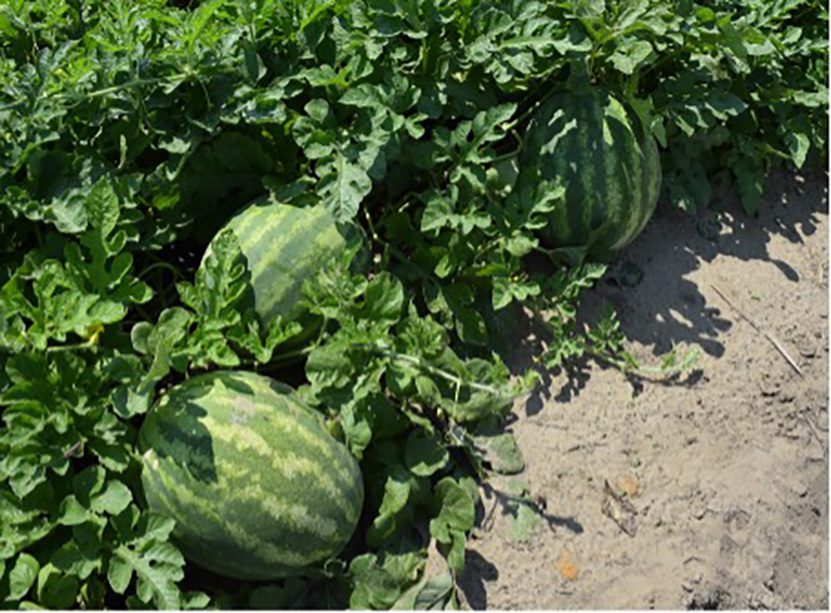
Our long-term goal is to develop organic fertilizers and strategies for higher nutrient-use efficiency, as well as weed and soilborne pest management.
Bhupinder Jatana, Clemson ag scientist
Consumer interest in organically produced fruits and vegetables is growing and to help growers meet this demand, Clemson University scientists are studying watermelon production methods to develop strategies to improve productivity and profitability of organic vegetables.
The team is led by Bhupinder Jatana, a researcher at the Edisto Research and Education Center in Blackville, South Carolina, and assistant professor of vegetable crops in the university’s plant and environmental sciences department.
Funding for the project is provided by a United States Department of Agriculture (USDA) National Institute of Food and Agriculture grant to address challenges such as crop nutrition management and controlling diseases and weeds in organic vegetable production.
Watermelon was selected as the crop for the study because it uses the same cultural and other management practices as other organic crops grown under plastic mulch, such as cucumbers, muskmelons, pumpkins and other cucurbits. Using plastic mulch is a common cultural practice in organic farming. Cultural practices are agricultural methods used to enhance crop productivity through conserving water and soil by reducing weeds, pests and diseases without the use of chemicals.
“Our long-term goal is to develop organic fertilizers and strategies for higher nutrient-use efficiency, as well as weed and soilborne pest management,” Jatana said.

Organic watermelon contributed to about 1.3% of the total watermelon sold in the United States in 2021.
“Even though the future of organic watermelon looks promising, it’s plagued by management challenges of nutrients, weeds and soilborne pests,” Jatana said.
During the study, the scientists will study crop nutrition. One of the difficulties in managing crop nutrition in organic production systems occurs because of a timing difference between the nutrient release rate of organic fertilizers and peak plant nutrient demand. For organic vegetable growers, this timing difference doesn’t allow enough nutrients to support periods of rapid crop growth, which can result in yield loss or decreased crop quality.
The scientists will develop new fertilizers using concentrated organic agricultural byproduct materials. Multiple organic agricultural byproduct materials will be tested. The scientists also will use various soil amendments to increase the retention of soil nutrients so that these nutrients are available for crop uptake for a longer period, allowing for higher nutrient-use efficiency.
In addition to challenges with nutrient management, diseases and weeds also result in substantial losses of organic vegetable crops worldwide. As part of this study, the scientists will pair the new fertilizers with novel plastic mulch, or new plastic mulch materials coming to the market such as biodegradable materials and so on, for controlling weeds and soilborne pests. They will use organic carbon amendments and irrigation under the plastic mulch to create an anaerobic condition known as anaerobic soil disinfestation, or ASD.
The ASD strategy is an alternative solution to use in place of chemical fumigation to control soilborne pests. It is a process of disinfesting the soil by creating anaerobic (oxygen-free) soil conditions using easily decomposable soil amendments, covering with plastic mulch and irrigating to saturate the soil. It has been proven effective against a wide range of pathogens in organically grown crops.
The impacts of the new fertilizers and novel plastic mulch on crop nutrient-use efficiency, soil health, nutrient losses and weed and soilborne pest management will be evaluated. The scientists will also evaluate the economic feasibility of using the new fertilizers and novel plasticulture.
In addition to Jatana, other Clemson researchers involved in this study are Matthew Cutulle, Brian Ward, Gilbert Miller and Anastasia Thayer. The researchers are also collaborating with Chandrasekar Kousik from the USDA Vegetable Laboratory in Charleston, South Carolina.
Communication about the project, including information about new fertilizers and management practices, will be made public through the Cooperative Extension Service.
Organic farming is becoming more popular. The latest figures from the USDA National Agricultural Statistics Service for organic farming in the United States for 2021 show a 13%, or $1.28 billion, increase in total sales and a 5% increase in the number of farms from 2019.
-END-
Get in touch and we will connect you with the author or another expert.
Or email us at news@clemson.edu
